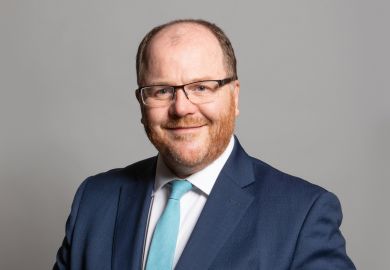More details about the UK’s new mid-career academic fellowships, which will focus on science, technology, engineering and mathematics (STEM), have been announced.
The Westminster government unveiled a £250 million endowment for the scheme as part of its Autumn Statement and has now confirmed that it will be managed by the Royal Society.
The fellowships, called the Royal Society Faraday Discovery Fellowships, will be launched next year and will support researchers for up to 10 years in all STEM subjects.
The awards, worth up to £8 million each, will be made on the basis of excellence. It is anticipated that at least 30 awards will be made in total over eight years.
Sir Adrian Smith, the president of the Royal Society, said that the fellowships would fill a funding gap for mid-career researchers that the society and others had repeatedly identified.
“The Faraday Discovery Fellowships are a welcome addition to the UK’s science funding landscape. The government’s £250 million endowment shows a real commitment to the kind of secure, long-term investment that is vital to the UK’s success,” Sir Adrian said.
“The UK is a world leader in research and to maintain and build on that success we have to be able to attract and retain outstanding talent. Supporting the best people and their teams to pursue their research will deliver breakthroughs that will benefit everyone.”
The new programme has been made possible by the “excellent terms for the UK to associate to Horizon Europe and Copernicus, getting great value for taxpayers while maximising opportunities for researchers”, according to the full Autumn Statement document, which was published shortly after chancellor Jeremy Hunt’s speech to the House of Commons.
The scheme arrives shortly after the departure of George Freeman as science minister, who had championed the need for what he called “really bold fellowships” that could rival the 10-year mid-career fellowships funded by Germany’s Max Planck Institutes. The proposals were also outlined in the UK’s Pioneer programme – otherwise known as Plan B – which would have been introduced if the UK had not been able to rejoin Horizon.
“I believe that the UK’s incredible science and tech success story is all about having the skills for the future, investment in scale-up and sensible regulation,” said Michelle Donelan, the Secretary of State for Science, Innovation and Technology.
“The chancellor’s statement injects even more fuel into our science and tech economy – and will help to realise my vision for a country where more high-value British jobs are driving us faster toward amazing discoveries that will help us live longer, healthier, happier, easier lives.”
Register to continue
Why register?
- Registration is free and only takes a moment
- Once registered, you can read 3 articles a month
- Sign up for our newsletter
Subscribe
Or subscribe for unlimited access to:
- Unlimited access to news, views, insights & reviews
- Digital editions
- Digital access to THE’s university and college rankings analysis
Already registered or a current subscriber? Login








